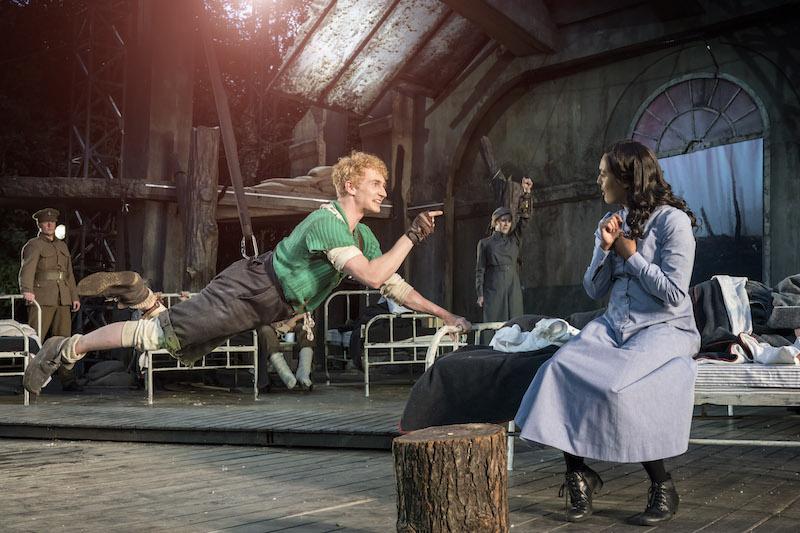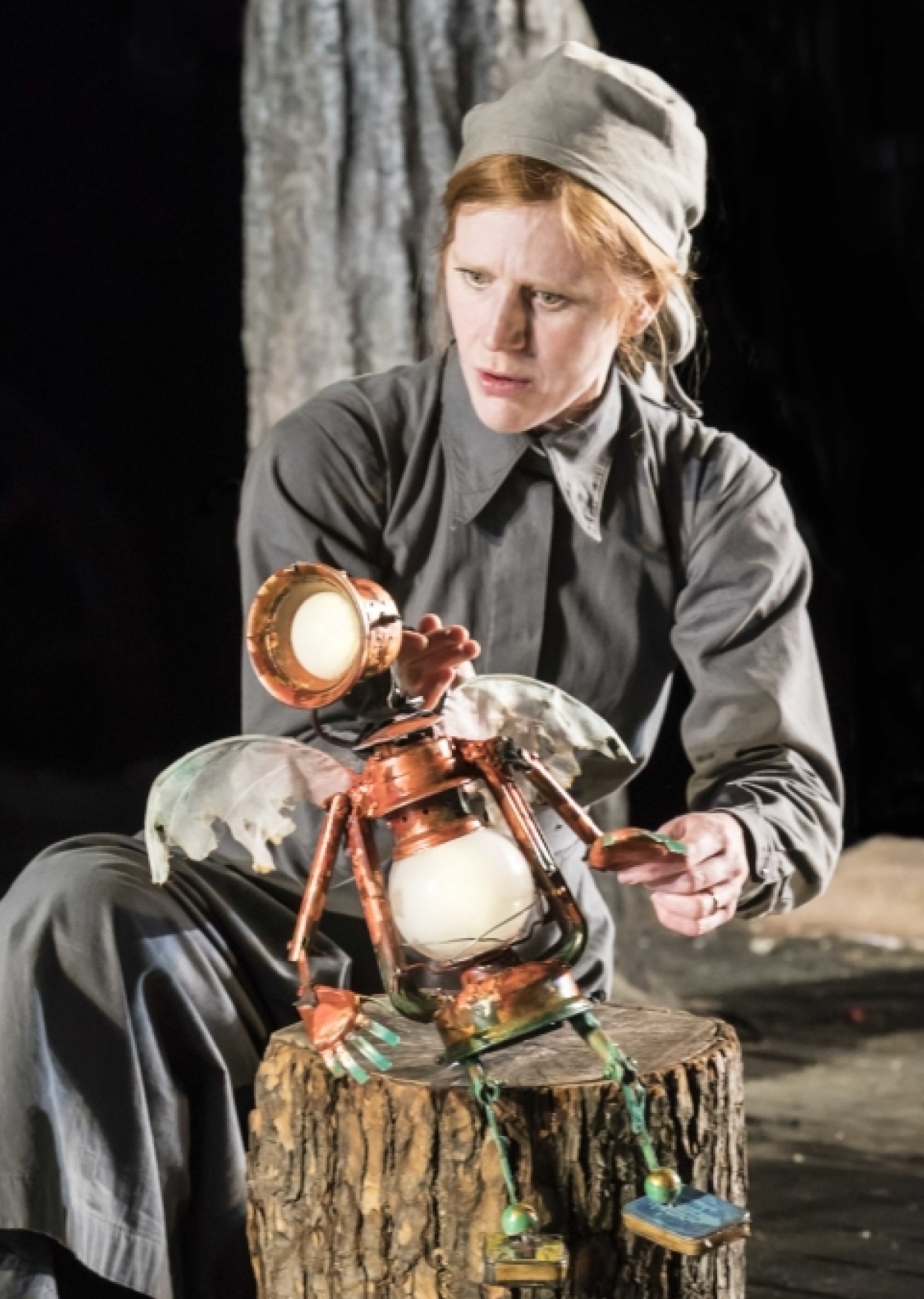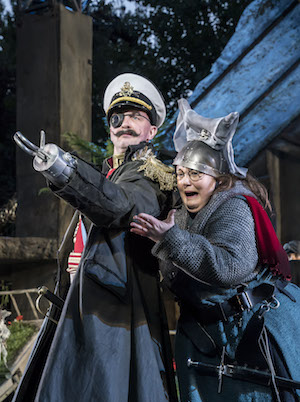Peter Pan, Regent's Park Open Air Theatre review - ensemble playing at its best | reviews, news & interviews
Peter Pan, Regent's Park Open Air Theatre review - ensemble playing at its best
Peter Pan, Regent's Park Open Air Theatre review - ensemble playing at its best
The boy who never grows up flies into the First World War

This exuberant production both clarifies and further complicates the conundrum of Peter Pan. In any production true to Barrie there is an underpinning of sadness, an acknowledgement of the losses we must all suffer: children leave home and adult responsibility takes the place of childhood innocence.
Barrie himself frequently altered the play, first produced in 1904 and revived annually for decades, and he made further changes for the novel, Peter and Wendy, published in 1911. The story had originally grown out of play-improvisations with his young friends,the Llewelyn Davies boys, and there seems no reason why it should not be developed further, especially when the result is as satisfying as this.
 The Darling household is reduced here to a dignified Edwardian figure who seems to represent Mrs Darling. The singer Rebecca Thorn threads through the action, expressing emotion – very movingly – in music, often songs from the Great War. This mother never interacts overtly with her children. Barrie "lost" his own mother when she mourned his dead brother, her favourite son, causing him to feel an inadequate substitute. In the years after the first success of Peter Pan, the five Llewelyn Davies boys suffered a series of tragedies. George, Michael, Peter, Jack and Nico were orphaned in 1910. George was killed in action in 1915 and Michael committed suicide aged 21. Peter Pan's cry, "Death would be an awfully big adventure", must have seemed dreadfully ironic.
The Darling household is reduced here to a dignified Edwardian figure who seems to represent Mrs Darling. The singer Rebecca Thorn threads through the action, expressing emotion – very movingly – in music, often songs from the Great War. This mother never interacts overtly with her children. Barrie "lost" his own mother when she mourned his dead brother, her favourite son, causing him to feel an inadequate substitute. In the years after the first success of Peter Pan, the five Llewelyn Davies boys suffered a series of tragedies. George, Michael, Peter, Jack and Nico were orphaned in 1910. George was killed in action in 1915 and Michael committed suicide aged 21. Peter Pan's cry, "Death would be an awfully big adventure", must have seemed dreadfully ironic.
The direction by Sheader and Steel combines the confidence and speed of a military operation with the gleeful energy and muddle of childhood. This is an ensemble working together with palpable, infectious enjoyment. Sam Angell's Peter is a coiled spring of cheek and daring, while Cora Kirk's maternal Wendy has the extra grown-up dimension of frontline nursing experience. Dastardly Hook (Dennis Herdman, pictured below, with Caroline Deyga as Smee) morphs from a martinet officer into a tin-can claw-wielding baddie.
 The whole operation is a joyful celebration of theatre. The splendid pirates – a ninja here, a French chevalier or Spanish hidalgo there – seem to have raided the dressing-up box. The rough and tumble fight in which Peter and the Lost Boys defeat the pirates – a cricket bat hits your bottom and you're dead – is a gloriously complicated set piece exhibiting the concentrated playfulness of childhood which spreads all over the stage and into the audience. Props appear to be improvised by soldiers in uniform conjuring gorgeous gas-masked mermaids or a crocodile snapping plank jaws. Beds, in Jon Bausor's clever design become poppy fields, a trench can be imagined into a lagoon. Tinker Bell is a customised lantern deftly manipulated and given personality by puppeteer Elisa de Grey (pictured above, right). The flying, done in full view, involves thick ropes and pulleys worked by some of those reliable "soldiers". It works a treat.
The whole operation is a joyful celebration of theatre. The splendid pirates – a ninja here, a French chevalier or Spanish hidalgo there – seem to have raided the dressing-up box. The rough and tumble fight in which Peter and the Lost Boys defeat the pirates – a cricket bat hits your bottom and you're dead – is a gloriously complicated set piece exhibiting the concentrated playfulness of childhood which spreads all over the stage and into the audience. Props appear to be improvised by soldiers in uniform conjuring gorgeous gas-masked mermaids or a crocodile snapping plank jaws. Beds, in Jon Bausor's clever design become poppy fields, a trench can be imagined into a lagoon. Tinker Bell is a customised lantern deftly manipulated and given personality by puppeteer Elisa de Grey (pictured above, right). The flying, done in full view, involves thick ropes and pulleys worked by some of those reliable "soldiers". It works a treat.
The overall effect, despite the constant intimations of mortality, is life-affirming. This production is seriously good fun.
rating
Explore topics
Share this article
The future of Arts Journalism
You can stop theartsdesk.com closing!
We urgently need financing to survive. Our fundraising drive has thus far raised £49,000 but we need to reach £100,000 or we will be forced to close. Please contribute here: https://gofund.me/c3f6033d
And if you can forward this information to anyone who might assist, we’d be grateful.

Subscribe to theartsdesk.com
Thank you for continuing to read our work on theartsdesk.com. For unlimited access to every article in its entirety, including our archive of more than 15,000 pieces, we're asking for £5 per month or £40 per year. We feel it's a very good deal, and hope you do too.
To take a subscription now simply click here.
And if you're looking for that extra gift for a friend or family member, why not treat them to a theartsdesk.com gift subscription?
more Theatre
 Hamlet, National Theatre review - turning tragedy to comedy is no joke
Hiran Abeyeskera’s childlike prince falls flat in a mixed production
Hamlet, National Theatre review - turning tragedy to comedy is no joke
Hiran Abeyeskera’s childlike prince falls flat in a mixed production
 Rohtko, Barbican review - postmodern meditation on fake and authentic art is less than the sum of its parts
Łukasz Twarkowski's production dazzles without illuminating
Rohtko, Barbican review - postmodern meditation on fake and authentic art is less than the sum of its parts
Łukasz Twarkowski's production dazzles without illuminating
 Lee, Park Theatre review - Lee Krasner looks back on her life as an artist
Informative and interesting, the play's format limits its potential
Lee, Park Theatre review - Lee Krasner looks back on her life as an artist
Informative and interesting, the play's format limits its potential
 Measure for Measure, RSC, Stratford review - 'problem play' has no problem with relevance
Shakespeare, in this adaptation, is at his most perceptive
Measure for Measure, RSC, Stratford review - 'problem play' has no problem with relevance
Shakespeare, in this adaptation, is at his most perceptive
 The Importance of Being Earnest, Noël Coward Theatre review - dazzling and delightful queer fest
West End transfer of National Theatre hit stars Stephen Fry and Olly Alexander
The Importance of Being Earnest, Noël Coward Theatre review - dazzling and delightful queer fest
West End transfer of National Theatre hit stars Stephen Fry and Olly Alexander
 Get Down Tonight, Charing Cross Theatre review - glitz and hits from the 70s
If you love the songs of KC and the Sunshine Band, Please Do Go!
Get Down Tonight, Charing Cross Theatre review - glitz and hits from the 70s
If you love the songs of KC and the Sunshine Band, Please Do Go!
 Punch, Apollo Theatre review - powerful play about the strength of redemption
James Graham's play transfixes the audience at every stage
Punch, Apollo Theatre review - powerful play about the strength of redemption
James Graham's play transfixes the audience at every stage
 The Billionaire Inside Your Head, Hampstead Theatre review - a map of a man with OCD
Will Lord's promising debut burdens a fine cast with too much dialogue
The Billionaire Inside Your Head, Hampstead Theatre review - a map of a man with OCD
Will Lord's promising debut burdens a fine cast with too much dialogue
 50 First Dates: The Musical, The Other Palace review - romcom turned musical
Date movie about repeating dates inspires date musical
50 First Dates: The Musical, The Other Palace review - romcom turned musical
Date movie about repeating dates inspires date musical
 Bacchae, National Theatre review - cheeky, uneven version of Euripides' tragedy
Indhu Rubasingham's tenure gets off to a bold, comic start
Bacchae, National Theatre review - cheeky, uneven version of Euripides' tragedy
Indhu Rubasingham's tenure gets off to a bold, comic start

Add comment